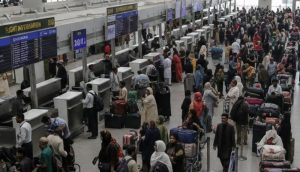WASHINGTON – A US federal judge temporarily halted Oklahoma’s controversial immigration law on Friday in a major victory for pro-immigration activists.
U.S. District Judge Bernard M. Jones issued the opinion stating that while Oklahoma may have concerns about issues caused by illegal immigration, the state cannot pursue policies that undermine federal law.
The fresh ruling prevents the enforcement of House Bill 4156, scheduled to go into effect on Monday; after the ruling, the law cannot be implemented until the case is resolved.
Commenting on the ruling, Oklahoma Attorney General Gentner Drummond expressed disappointment with the court’s decision, asserting that he will not stop fighting for Oklahoma and the right to protect the borders; the official also indicated plans to appeal the ruling.
As far as the details of the controversial legislation are concerned, HB 4156 requires noncitizens convicted of violating its provisions to leave the state, effectively granting Oklahoma the independent authority to exile noncitizens from the State and thereby permitting a patchwork of state immigration schemes.
Under the law, a first offense is classified as a misdemeanor punishable by up to one year in county jail, a fine of up to $500, or both, with a requirement to leave the state within 72 hours. A second offense escalates to a felony carrying a penalty of up to two years in prison, a $1,000 fine, or both.
Shortly after its enactment, the law faced legal challenges. The federal government’s lawsuit against the piece of legislation argued that Oklahoma was overstepping by regulating immigration, a domain reserved for federal authorities under the U.S. Constitution.
Another lawsuit, filed by an individual and an advocacy organization, was subsequently consolidated with the federal case.
“This Court finds these cases persuasive and concludes that the balance of equities and public interest factors weigh in favor of granting injunctive relief when, as here, the state law is likely preempted by federal law,” the order said.
The ruling is important in the backdrop of the presidential debates currently being conducted and the immigration issue taking center stage during these discussions.














